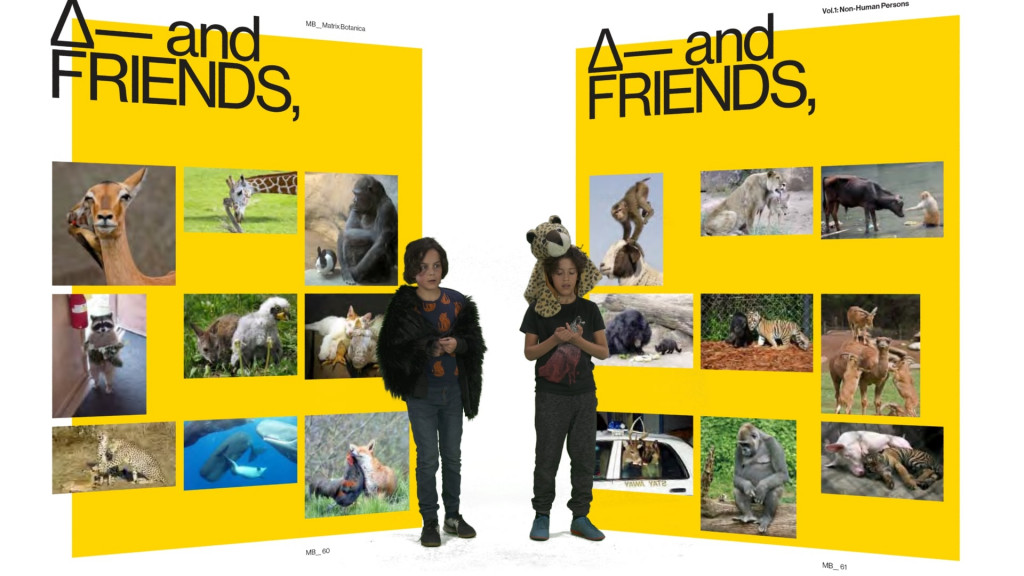Melanie Bonajo
Profile
Profile — Nov 23, 2018
Melanie Bonajo’s video installation Progress vs Sunsets: Reformulating the Nature Documentary is the second work in a trilogy focusing on the effects of technological advances on vulnerable, marginalized groups. While the first installation in the series concentrates on the elderly, Progress vs Sunsets invites children to consider the ways that viral animal photos and videos have redefined the relationships between humans, wildlife, and the environments they share. Bonajo asks which voices are ignored during processes of growth and development, and draws attention to the extinctions and casualties that are the inevitable side effects of innovation. She approaches her work from an intuitive, feminist point of view, emphasizing the importance of process over product, and casting doubt on narratives of progress.
Bonajo spent ten years meticulously collecting and cataloguing images and videos of animals distributed online, which appear in the film and are reproduced on the hanging posters that surround the installation. From this research, she developed a series of urgent philosophical questions about the position animals inhabit in a world now defined by omnipresent digital media. The installation’s central work, a nearly hour-long video, features a steady stream of poignant and often humorous responses from children. Using special effects and playful animation, Bonajo depicts them alongside animal videos, emojis, and stock images, resulting in a punchy, web-informed aesthetic. Toward the end of the film, their flow of answers is interrupted by shots of a different group of children, covered in war paint and clad in feathers and masks, wordlessly performing ritualistic acts and roving around the woods. They occupy spaces eerily devoid of other living beings, suggesting both a prehistoric past and post-apocalyptic future. Through their verbal responses and performative actions, these children provide an alternative to the normative beliefs and behaviors that have reinforced the supremacy of humans over animals and nature.


In contrast with the professionally produced, science-driven nature documentaries of previous decades, which depicted animals in their natural habitats, the viral memes and videos in Bonajo’s installation show them inhabiting a distinctly human world, where they serve primarily as objects of entertainment. The artist points out that shifts in the representation of animals have occurred in tandem with greater animal rights issues, such as large-scale environmental destruction and increased urbanization, which push animals into closer proximity to people. She notes that while policies that promote the interests of native inhabitants over immigrants are considered xenophobic in human communities, they become necessary to the survival of animal ecosystems. Bonajo sees the treatment of animals as directly connected to histories of imperialism, slavery, and forced migration. By illustrating how categories such as “human” and “animal” have fostered hierarchies and the creation of “others,” the installation serves as a case study in how oppression operates. The artist’s choice to include children in the project stems from her belief that they have not yet fully internalized dominant Western patriarchal systems of thought that favor reason and objectivity, and are guided instead by emotion and intuition.
The film is situated within a bright yellow immersive installation environment designed to encourage visceral, affective responses in viewers and promote feelings of comfort and safety. A giant stuffed animal serves as a seat, and invites audiences to reconnect with their childhood mode of experiencing the world. With Progress vs Sunsets, Bonajo encourages her audience to reconsider the lenses through which they view those different from themselves, and to reflect upon the systems of power that value certain lives over others.

About the artist
Melanie Bonajo (b. 1978, Netherlands) studied at the Gerrit Rietveld Academie in Amsterdam and has held residencies at the Rijksakademie van Beeldende Kunsten in Amsterdam and the International Studio & Curatorial Program in New York. Her work has been shown and performed at venues including the Bonnefantenmuseum, Maastricht; Frankfurter Kunstverein, Frankfurt; FOAM, Amsterdam; Haus der Kunst, Munich; Manifesta 12, Palermo; MARTa Herford; STUK, Leuven; Fondazione Prada, Milan; Museum Arnhem; Mains d’Oeuvres, Saint-Ouen; De Hallen, Haarlem; EYE Film Institute, Amsterdam; De Appel Arts Centre, Amsterdam; Center for Contemporary Art, Warsaw; and the National Museum of Modern and Contemporary Art, Seoul.


